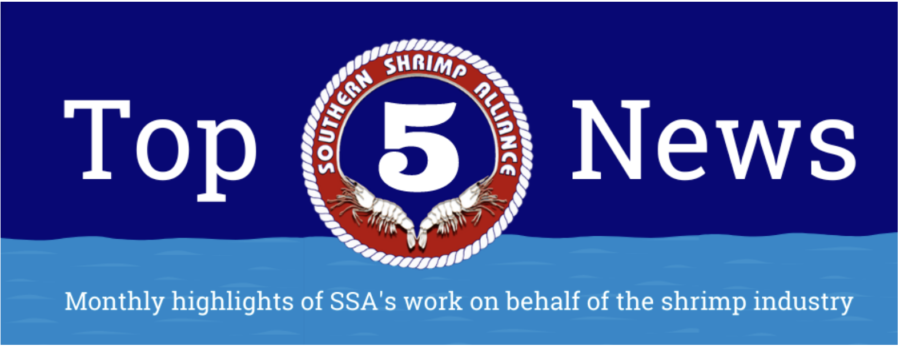

SSA Alleges Violations of the Uyghur Forced Labor Prevention Act (UFLPA)
SSA filed an e-Allegation with U.S. Customs and Border Protection claiming that Argentine Red Shrimp was being shipped to China for processing in plants operating in the Shandong province, where members of the Uyghur minority have been forced to work, before being exported to the United States. SSA documented how Argentine Red Shrimp is imported into the United States from China as a product of Argentina, with no indication as to where the shrimp was processed.
Why This Matters
- Non-Chinese-origin shrimp from Argentina, Ecuador, and Indonesia are being sent to China for processing before export to the United States. This shrimp is entered into the United States as a product of the country in which it was harvested rather than processed and is not subject to the 25 percent duty on all other Chinese seafood.
- The U.S. shrimp industry must continue to aggressively oppose efforts by importers to benefit from the exploitation of vulnerable populations across the world.
A lack of transparency in foreign seafood supply chains has allowed U.S. importers to take advantage of forced labor in provinces throughout China, including Shangdong and Liaoning.

ASPA Files Petitions for Trade Relief on Shrimp from Ecuador, India, Indonesia, and Vietnam
The American Shrimp Processors Association (ASPA) petitioned for the imposition of antidumping and countervailing duties on unfairly-traded shrimp imports from Ecuador, India, Indonesia, and Vietnam. If ASPA succeeds, there will be additional trade relief on imports beyond the antidumping duties that the Southern Shrimp Alliance obtained on imports of Chinese, Indian, Thai, and Vietnamese shrimp in 2005.
Why This Matters
- After efforts to obtain countervailing duty relief from subsidized shrimp imports failed in 2013, foreign governments have poured hundreds of millions of dollars into their shrimp industries to encourage exports to the United States.
- If formally initiated, new investigations into unfairly-traded shrimp imports could begin to have a market impact in early 2024.
Ten years ago, the Coalition of Gulf Shrimp Industries was unable to prove that the Indonesian shrimp industry was receiving countervailable subsidies and could not demonstrate that American shrimp processors were materially injured by reason of subsidized imports from China, Ecuador, India, Malaysia, and Thailand. While trade relief is not guaranteed, broad participation from the entire domestic shrimp industry will help ensure a positive outcome.

Win: NMFS Rejects 10-Knot Speed Limit, Prohibition on Nighttime Operations
NMFS rejected a petition filed by several environmental groups to impose a 10-knot speed limit and to prohibit nighttime vessel operations in a large area of the northeastern Gulf to protect endangered Rice’s Whales. In June, SSA submitted comments opposing the petition because it adversely impacted shrimp fisheries without reasonable benefits.
Why This Matters
- NMFS’s determination is a significant win for the shrimp industry. The agency received more than 75,000 public comments—the majority of which appear to be form letters generated by the environmental groups to support the petition.

SSA Opposes the Government of Vietnam’s Request to Be Treated as a Market Economy
In response to a request from the government of Vietnam, the Commerce Department has begun an expedited review of conditions in Vietnam to determine whether the country now operates a market economy. If successful, the United States would change its administration of antidumping duty orders covering merchandise from Vietnam, like shrimp. A wide range of U.S. industries, including the shrimp industry, have opposed Vietnam’s request for expedited treatment, but Commerce is moving forward regardless.
Why This Matters
- The government of Vietnam remains heavily involved in the country’s economy, distorting how investments are made and resources are allocated.
- Because Vietnam remains a non-market economy, allowing Vietnamese industries to be treated the same as industries operating in market economies would severely undermine the effectiveness of antidumping duty orders.
- Effective trade relief has limited Vietnamese participation in the U.S. shrimp market. A weakening of antidumping duty disciplines would increase the harm that Vietnamese shrimp are causing in the marketplace.

Proposed Critical Habitat for Green Sea Turtles May Close Fishing Areas
SSA formally requested NMFS exclude certain areas of the draft critical habitat for the Green Sea Turtle. The current proposal could close areas or restrict fishing, harming the Gulf and South Atlantic shrimp fisheries. The Shrimp Advisory Panel also unanimously adopted a motion SSA offered that supports the arguments found in SSA’s comments.
Why This Matters
- The proposed rule relies on information from a 32-year-old Recovery Plan. This data predates protections under the existing Green Sea Turtle critical habitat. It also ignores the extraordinary achievements shrimpers have made since 1991 to minimize their impacts on sea turtle populations and sensitive habitats.
